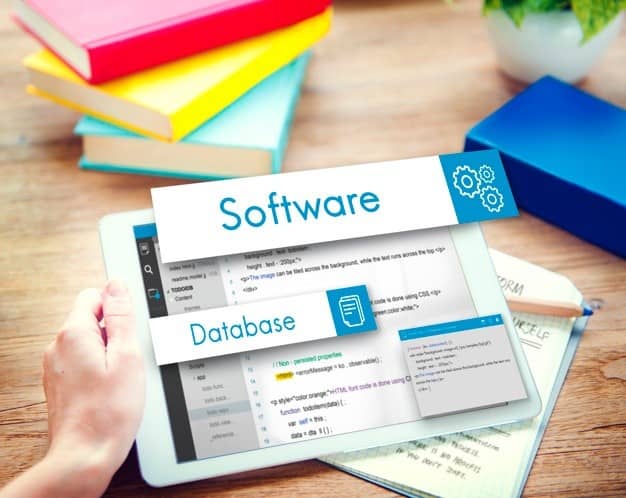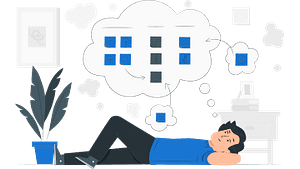As a business grows, many applications are needed to organize and manage content, maintain records, keep track of orders and invoices, plan and manage resources, etc. Using HazenTech’s Enterprise Application solution, businesses may run their operations without interruption. We at HazenTech recognize that Enterprise Applications are never one-size-fits-all. Hence, we offer a wide range of options, from modifying your current application to designing a new one from scratch.
Abstract

In today’s cutthroat competitive market, every company seeks to stand out and stay ahead of its rivals because the winner takes it all in many fields. Firms need to provide their clients with the most satisfactory possible service in the quickest amount of time. And to achieve this, organizations are transforming and innovating their business processes to the fullest extent possible. As a result, organizations must employ digital technologies, such as Enterprise Application solutions, to innovate at warp speed.
What Is An Enterprise?
An enterprise is a group of people who work together to accomplish a common goal. The most typical large-scale business initiative can be considered an “enterprise” in the strictest sense of the word.
From a sole proprietorship to a small or medium-sized business, the term “enterprise” can apply to any business. On the other hand, the term “enterprise” often refers to a large-scale organization with a wide range of commercial functions in both the public and private sectors. The following are a few well-known business entities:
- Organizations with a global reach
- entities governed by the federal, state, or municipal governments
- Large and medium-scale national businesses
- School districts and clusters of schools
- Charitable or non-profit organizations that operate in numerous locations or regions.
All of the examples above have one thing in common: personnel in an enterprise setting need to be able to access a large amount of data or operations in order to do their duties. Sales, customer service, IT, finance, and even analytics are all examples of these professions. A wide range of data can be gathered, including information on sales and customers, security and policy information; product specifications; communication logs; productivity measurements; and service level agreements (SLAs).
Put another way: a massive corporation with a diverse workforce performing a wide range of tasks is what we mean when we talk about an enterprise.
What is Enterprise Application solution?

Let’s take a closer look at the Enterprise Application solution; now that we get our head around this application’s functional scope is the first step. These apps must address a wide range of requirements if they are to be useful to businesses. An enterprise’s mission-critical solution is generally provided by Enterprise Application solution, which is at the heart of every business.
The term “Enterprise Application solution” refers to a single piece of software that performs most, if not all, of the functions required in an enterprise context.
Enterprise Application solution characteristics
It is possible to categorize Enterprise Application solutions into two groups:
- Complex data visualization, manipulation, and storage software. While data warehouses and data analytics software are business solutions, they are not part of the EAS and are treated as different entities.
- Software that aids in running a business, from business assistance to automation.
- Depending on the underlying needs, EAS software in each of these categories can have various properties. In general, though, we can note the following traits.
- The generality of the situation. This software must run an entire company, which may be located in different parts of the world. As a result, it should be able to function and execute well in all of the company’s locations. Most EAS software has built-in support for remote workers, as more companies rely on a distributed workforce.
- Adaptability and scalability. An essential part of any software application is the need for this. However, this software aids the organization’s mission-critical function in an organizational environment, making its relevance even greater. Stability and usefulness shouldn’t have to be sacrificed for the software to expand with the company.
- A single point of contact for all management and administration. If the EAS doesn’t meet these requirements, it won’t support the enterprise’s objectives and ambitions. This is a no-brainer.
- We are dedicated to advancing the company’s primary objective. This is a no-brainer: the EAS must provide necessary functionality to the organization and assist the enterprise in achieving its goals and objectives.
- Adaptability and expansion. The global landscape is continuously changing, and so are the needs of businesses. It’s important to have an EAS that can swiftly adjust to new workflows without affecting the overall business process. Additionally, an EAS must communicate with other software services and platforms via APIs, plugins, and extensions, as most businesses do.
Types of Enterprise Application Solution

There is no single software program that can meet the needs of an entire company. A variety of EAS applications are available to meet the needs of different organizations. The following is a list of some of the software in question.
- Systems for Managing Human Resources
- Accounting and Payroll Software
- Relationship Management and Customer Service (CRM)
- Systems for sending and receiving email
- Systems for the Management of Sales and Marketing
- Systems for the Management of Incidents
- Organizational Analysis and Design (ERP)
- The administration of projects and portfolios
- Software for managing the supply chain (SCMS)
- Workplaces
All of the software listed is designed to meet the needs of a particular business. As a general rule, most businesses use various software systems to do their various tasks. Previously, I mentioned the importance of scaling your system up and down. An EAS with more connectivity options, including other platforms, gives organizations greater flexibility in selecting the EAS that best meets their needs without being vendor-locked.
What are Enterprise Application solutions?

Applications employed at the corporate level are referred to as “Enterprise Application solutions” or “enterprise application solutions.” Companies can use these advanced technological solutions to automate tedious tasks, boost revenue generation, eliminate human errors, meet changing business landscapes and needs, improve business operation’s accuracy & efficiency and make informed operational decisions, to name just a few benefits.
The following list and analysis of the top ten enterprise software products suit all firms of all sizes to get the most bang for their buck for various developed and developing countries.
Top 10 Enterprise Application solutions:

The one common thing among all of these top 10 enterprise application solutions is that they control and connect all applications of your company and simplify all business processes.
- ERP Software
Many company tasks may be managed, and data flowed across them using ERP software, an enterprise process management tool. With this one, complete systems, procedures, and sub-processes can be simplified, automated, or streamlined to maximize resources.
Many options are available in the market for ERP software, making it difficult to choose the best one for your company. The products and services offered by each company are distinctive in some way. It is possible that ERP’s conventional functionality does not meet your company’s specific needs. As a result, businesses must pick an ERP system with the features they need. For this, ERP software should be tailored to the company’s business model using it. With a tailored ERP solution, firms may increase production and efficiency, acquire a competitive advantage, and generate high ROI.
- CRM Software
Client relationship management is referred to as CRM. As a result, CRM software is a data-driven software solution that aids businesses in maintaining and retaining relationships with their consumers.
Customers are an organization’s greatest asset; it should go without saying. So, CRM is a must-have tool for any business. To be sure, CRM software easily available on the market comes with a slew of extraneous and pointless features. Businesses adopting off-the-shelf CRM systems must pay a lot of money for features that they don’t need. To make the program work with their CRM system, organizations must acquire additional add-ons, which is another expense that might be prohibitive for small businesses. Custom CRM, on the other hand, may be the best option. Custom CRM software allows firms to omit features they don’t need and build only necessary ones for their business. It also works well with your existing platforms because it was created for you especially.
- Project Management software
It is a daunting undertaking to plan, organize, streamline, track, control, and manage project work while meeting deadlines. Project management software can help with this. Regardless of the organization’s size, project management software is essential.
According to Wellingtone’s survey, the adoption rate of project management software continues at 22%. However, enterprises have a reasonable chance to keep up with the competition. However, to stand out from the crowd, you’ll need a plan that no one else has thought of. This can be accomplished through the use of highly customized project management software. A single, integrated platform powered by custom software will enable businesses to create workflows tailored to their specific needs and execute those processes to the letter, resulting in higher sales and higher profit margins. Doesn’t this give you a leg up in the market?
- Content Management System
With the help of a Content Management System (CMS), web content management has never been easier (CMS). There are no coding skills or experience required for the content production and marketing staff to easily manage information at their fingertips.
Off-the-shelf CRM platforms, such as CMS platforms, are inexpensive and easy to use, but they lack security, a major concern for any reputable firm. Hackers can disrupt SEO rankings and digital content theft by infiltrating open-source CRM software.
It’s a good idea to use a custom CRM platform to secure websites. To protect your organization’s source code from hackers, custom CRM platforms are designed from scratch for your company and are therefore less vulnerable to cyberattacks.
Another reason why an attack on a custom CRM platform is uncommon is that, despite the considerable effort required to identify a vulnerable site, hackers are only successful in infecting a single site using popular open-source CMS (such as WordPress). It’s all about the return on investment for hackers, too.
In addition, additional security borders can be installed for an additional degree of protection. In addition to the security advantages, a custom CRM platform offers a wide range of customization options, minimal to no delays, and a wide range of plugins. It’s very amazing, isn’t it?
- Marketing Automation Software
Using automation software, repetitive, time-consuming tasks like sending emails and posting information on social media can be done without the need for a human touch. This program handles all of the automated marketing procedures and communication actions, and it helps marketers turn a potential consumer into a paying customer.
According to the survey, 75% of marketers now widely use marketing automation, which shows just how pervasive it is. You must, however, outperform your competitors to survive in such a crowded market. Others are currently focusing their efforts on acquiring new customers and cultivating relationships with those already in their database.
Personalization of the buying experience begins with collecting and analyzing detailed information about each customer’s shopping habits. A custom marketing automation program is the only way to achieve this, as every company’s marketing activities are unique, and their customer’s data is unique.
When it comes to customer data analysis, organizations can instead opt for a customized system, which will be tailored to their business type, nature, and client base, rather than relying on a generic system.
- Human Resources Software
Software that automates various HR processes, including talent management, leave and absence management, payroll administration, performance management, and many more, is called Human Resource Management Software (HRMS).
Using this software, HR departments may better focus on strategic initiatives. Amid the HRMS revolution, some forward-thinking organizations are looking into how a custom HRMS may benefit them. It will be possible to create personalized rewards, tailored reports, and unique performance evaluation forms and reports with an HRMS that can be customized on top of the existing platform.
- Enterprise Asset Management Software
A company’s properties, infrastructure, inventories, and equipment are all managed through Enterprise Asset Management Software (EAM). EAM can automate asset condition monitoring, ensure safety management, take care of inventory and labor management, comply with legal and environmental laws, and much more.
HOWEVER, one-size-fits-all EAM software won’t deliver outstanding results because it’s too generic. You must be wondering, aren’t you?
Off-the-shelf EAMs aren’t aware of any organization’s unique asset goals and requirements. The functionality of this program may not apply to your business model. Custom EAM systems, on the other hand, allow companies to modify the software to meet their specific requirements.
- Enterprise Mobility Management Software
Using Enterprise Mobility Management (EMM) software, firms can ensure that their networks and data are safe for their employees’ mobile devices.
Today, every company’s primary focus is on security. The EMM system should address this problem. The EMM system, on the other hand, is at risk from virus advancements. A zero-day remote access vulnerability was discovered in Samsung SDS’s EMM by researchers in 2018.
To protect the EMM system, firms can securely choose custom EMM software. EMM systems created from the ground up with the company’s needs in mind are a winning strategy for BYOD implementation.
- Enterprise Business Intelligence Software
Businesses can acquire valuable insights from structured and unstructured data with the help of enterprise business intelligence (BI) software. Organizations can generate reports in minutes, integrate seamlessly with an existing platform, control the reports, and have no additional fees to expand functions with the correct BI system, just to name a few advantages.
Although it is crucial to remember traditional BI software will not deliver all of these features. To add plugins, the manufacturers will charge additional license fees. Instead, businesses should go for BI software specifically tailored to their needs. Furthermore, specialized BI solutions protect your confidential information from unauthorized access. Isn’t it a wise decision to make this investment?
- Enterprise Internal Communication Management Software
Enterprise Application solutions are very effective at reducing costs and investments to encourage information exchange and lowering time and efforts. An organization’s internal communication can be improved by using an enterprise communication management system, which makes it easier for employees to exchange information at any time.
Open-source software for managing internal communications is readily available, but it may not be the most cost-effective option. You must be wondering, don’t you? As far as I know, every piece of data exchanged will be stored in the communication system. The information in this document may contain private or confidential information. Hackers are eagerly awaiting sensitive data, and this system is a perfect target for them.
Additionally, no two businesses are alike. The type of business should determine the type of communication system to use. Any hospital organization, for example, should use HIPAA-compliant software such as HazenTech.
Conclusion
The goal of all Enterprise applications is to integrate multiple systems that are responsible for running all phases of an enterprise’s operations. These applications are designed exquisitely to facilitate coordination and cooperation of work across all enterprise departments.
Enterprise Application Solution (EAS) is a collection of software tools used by firms to improve the efficiency of their day-to-day operations and financial performance. HazenTech’s enterprise application solution expands its scope to link the enterprise with suppliers, business partners, and customers.
For example, these solutions could be used in the areas of ERP, CRM (Customer Relationship Management), Approval Flow, Process Management, Document Control, Business Intelligence, and Messaging, to name a few.
Companies no longer have a choice but to implement an Enterprise Application solution in the digital world. The extensive use of these Enterprise Application solutions in today’s tech world can be noticed by looking at the estimated spending to be more than $326 billion per year.
Hazentech Supports Enterprise Applications

For so many years now, HazenTech, a leading provider of enterprise software, has served businesses of all sizes. Your entire organization can benefit from HazenTech’s enterprise application solutions, from service and operations management to workload automation. Please visit our website at HazenTech and get in touch with our team of data integration and litigation support experts to help your business grow like never before.










